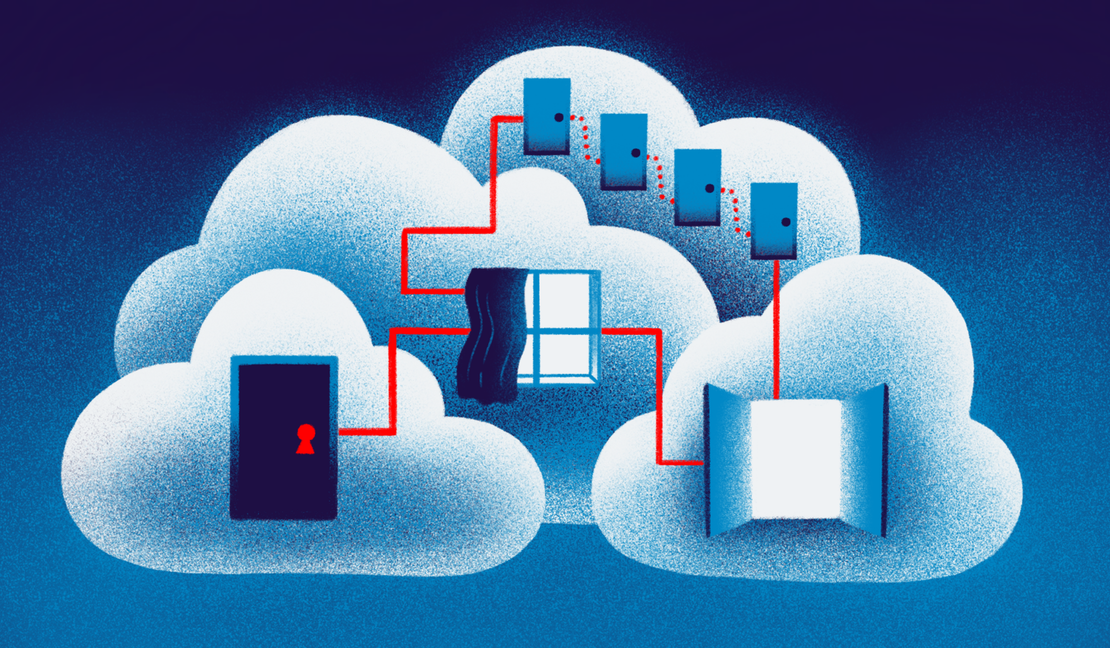
The Four Types of Cloud Storage: Pick the Right One for You
- Cloud networking
- July 15, 2022
- RSS Feed
By Brian Bowman, Senior Solutions Architect
Explore the four main types of cloud storage—public, private, hybrid, and community—and find out which solution best fits your business needs. Understand the pros, cons, and use cases for each storage model, from security to scalability.
Cloud storage is an essential component of any modern business. Whether it’s an application’s database or safekeeping customers’ personal details, you’ll need a storage solution that securely and efficiently meets your enterprise’s unique digital needs. And as the ways businesses use the cloud continue to expand—especially with the increased demand for access-from-anywhere network models—so too do the number of cloud storage solutions.
Table of Contents
What is cloud data storage?
Put simply, cloud storage enables you to store your business’ and customers’ data on hosted servers. It eliminates the need to buy and manage your own storage infrastructure by operating through a cloud computing provider who manages your data capacity and security on your behalf, generally through a pay-as-you-go model that is delivered over the internet. As part of the service, providers typically store your data in multiple locations to ensure redundancy.
For file storage, of course, businesses once relied on computer hard drives and other physical storage options to host and access their masses of data. But this infrastructure, at least used alone, is not suitable anymore for modern businesses – hard drives only store a finite amount of data. Plus, if something were to happen to your physical storage, such as a system malfunction, your business may lose critical files.
Also, the amount of data processed by applications and devices has increased by magnitudes over time, making object storage, which enables data to be stored by objects unstructured by file hierarchies, a necessity. Examples of object storage use cases include photos and videos on Facebook or songs on Spotify. Amazon S3 is a commonly used object storage solution provided by AWS.
By storing data such as audio-visual files, applications, and documents in the cloud, the need to purchase and maintain traditional, physical storage infrastructure is eliminated, as the data is stored in the cloud provider’s data center and the enterprise pays only for the infrastructure they use.
Why cloud storage?
Cloud storage is a popular solution for a handful of reasons:
- Security: by minimizing the risk of data loss. When you store your data in the cloud, files are encrypted to protect against cybersecurity threats such as data breaches or viruses. Mission-critical data can also be stored redundantly, ensuring there’s a backup copy should a force majeure event strike, meaning your business stays up and running.
- Cost-effectiveness: you only pay for the infrastructure you use, meaning you can treat cloud storage costs as an ongoing operating expense that changes alongside your needs, rather than the upfront capital investment to purchase physical infrastructure.
- Ease of implementation: cloud storage is also easy to implement and expand—with setup possible in a matter of hours, managed by the cloud provider, not you. This frees your staff from the responsibility of administration and security.
Cloud storage can be separated into four categories:
- Public cloud storage
- Private cloud storage
- Hybrid cloud storage
- Community cloud storage
Each of the solutions above have their own strengths and weaknesses, and suit particular use cases. But what exactly are the differences between these four types, and which one could best meet your business’ needs?
4 types of cloud storage
Public cloud storage
Public cloud storage is a popular route for businesses needing a quick and simple way to store their important data. Users of a public cloud storage solution—including those provided by hyperscalers such as AWS and Microsoft Azure — can connect over the internet and store data within the cloud provider, who maintains the system.
The pros
Benefits of using a public cloud storage solution include:
- Broad ease of access – because the interface to the storage cloud is via a web browser over the internet, data is accessible from any device, anywhere. Employees working remotely can access application data they need.
- Scalability – storage capacity can be dynamically scaled up or down as your business’ needs change. Not only is a public cloud solution scalable space-wise, but most cloud providers offer flexible performance level options as well, meaning you can tailor your storage to specific application or period demands as required.
- Affordability – while there are costs to using a public cloud, the expense is much smaller than the capital and management overhead of on-premises storage.
- Zero maintenance – when you utilize cloud storage through a public provider, the provider takes responsibility for maintaining and administrating the platform, meaning users aren’t required to hire or train staff devoted to managing data storage.
- Easy to deploy – by operating through a web portal, setting up your public cloud is easy for users to do from their computers, and can be completed within a day.
The cons
- Little opportunity to customize security measures – security measures on public clouds are common for all users (businesses) who use the platform. This means there can be little room to tweak the platform to suit your business’ unique security protocol requirements.
- Egress costs – public cloud storage providers may charge you to take data out of their cloud, often in an effort to persuade you to stay within their platform and not migrate data to competitors.
- Unreliable performance – although generally reliable, performance can waver due to public clouds being in a shared environment. In particular, latency can occur depending on the amount of traffic moving to and from the cloud. We’ve covered the real cost of high network latency in our blog post.
Use cases
Public cloud storage is ideal for businesses that need a flexible, easily accessible hub for storing and sharing data across multiple devices and locations. This makes it perfect for organizations with remote teams or those relying on collaboration tools for managing shared documents, imagery, or application data.
For example, marketing teams can store branding assets in the cloud for quick access by both in-house and external creative teams, streamlining workflows and ensuring consistency.
Public cloud storage is a cost-effective solution for businesses seeking a reliable backup and disaster recovery strategy. By keeping a secondary copy of essential data in the cloud, companies can protect themselves against hardware failures, cyberattacks, or natural disasters that may compromise their primary storage. This ensures business continuity by allowing quick restoration of critical systems and data, minimizing downtime and potential losses.
Private cloud storage
Private cloud storage, on the other hand, resides within your network by leveraging physical infrastructure to create virtual servers that store your company’s data. This can be achieved by ownership of an on-premises private cloud, or through a cloud storage provider who can build a dedicated private cloud, accessible only to you through a private connection (and not shared in the same cloud as public cloud storage operates). Also known as enterprise or internal cloud storage, data is stored in the company’s intranet and protected by their own firewall.
The pros
- Bolstered security – private cloud ensures an extra level of security, as opposed to public cloud, by hosting critical data inside a protected environment that has solely been created and is solely accessed by your business.
- Increased, fine-tuned control – companies can hone in on their data to a much greater extent and be ‘closer’ to their cloud storage due to its on-premises and private nature, to oversee and monitor their data effectively.
- Better compatibility – through synced applications across your private cloud storage, you’ll experience better compatibility and communication between clouds, which means better performance and reduced latency.
The cons
- Higher costs – private cloud models are generally more expensive (tips on how to get a more cost-effective network). This is due to hardware expenses, data centers, software licenses, and even the creation of dedicated IT experts within your team for deployment and maintenance.
- Time- and labor-intensive deployment – deployment of a private cloud can be more difficult as you’re using in-house resources to set up and maintain infrastructure.
- Decreased scalability – you may not be able to scale your capacity and performance capabilities up and down –a feature that’s crucial for any business’ agility – any with the same freedom as leading public cloud storage providers. Instead, your business may need to commit to paying for more network resources and infrastructure than you use.
- Limited remote and external access – along with stricter security measures, there are tougher access restrictions. Employees not working on-premises may find it difficult to access files, which is problematic in a work-from-anywhere business environment. And for companies who share data with external stakeholders, such as freelancers or agencies, creating permissions to share data may prove troublesome. There may also be device limitations, such as accessing data from mobile phones or over home Wi-Fi networks.
Use cases
Private cloud storage is best suited for larger organizations with significant IT budgets and strict compliance requirements. Industries like banking, finance, and healthcare often choose private cloud solutions to ensure sensitive data—such as financial records or patient information—remains highly secure and fully compliant with regulations like HIPAA or GDPR. The dedicated infrastructure provides these organizations with full control over how data is stored, accessed, and protected.
In addition to compliance, large enterprises with their own data centers often opt for private cloud storage for its ability to offer granular control over infrastructure and security. For instance, a global retail company managing vast amounts of customer and transactional data may rely on private cloud storage to oversee data flow, monitor performance in real-time, and fine-tune security settings to meet their specific needs. With greater visibility and control, private clouds allow businesses to customize their storage environment for optimal performance and compliance.
Hybrid cloud storage
Hybrid cloud storage combines elements of both private and public cloud storage solutions. This means businesses have more choice over which data they store in which cloud. For example, they may want to deploy a private cloud for sensitive data, while operating a public cloud for data that needs to be more accessible and is less high-risk, such as branding imagery. Businesses can use hybrid cloud strategically to get ‘the best of both worlds’ and reduce costs while maximizing customization where they can.
The pros
- Flexibility and mobility – the hybrid model allows businesses to direct its resources to either private or public cloud environments quickly, as well as move data between the two.
- Remote access – like the public cloud, hybrid clouds allow remote users to access data from devices and locations outside of the office.
- Scalability – also like the public cloud, storage capacity and performance can be scaled up or down as you need.
The cons
- Difficult to implement and manage – operating a combination of the two cloud storage solutions can leave businesses struggling to efficiently organize and access their data, especially with decreased visibility with data located in various locations.
- Security concerns – as with public cloud, your data is at increased risk of cyberthreats over the public internet.
- Compatibility headaches – files may not be compatible between the public and private cloud. Learn more about how interconnecting your cloud stack can improve compatibility between your cloud suite.
Use cases
Hybrid cloud storage is frequently used in disaster recovery planning. By using a private cloud for primary data storage and a public cloud for backups, businesses can reduce the risk of data loss due to geographic disasters while avoiding the expense of maintaining two private data centers. This hybrid approach ensures critical data is securely stored in diverse locations, providing a cost-effective solution for redundancy and business continuity.
Hybrid cloud storage is also ideal for data archiving. Businesses can store infrequently accessed data, such as old transaction records or historical customer information, in a public cloud to lower costs, while keeping more sensitive or frequently accessed data in the private cloud. This allows companies to balance cost and performance without compromising on security or compliance.
Community cloud storage
With community cloud storage, private cloud providers offer their cloud architecture and software to meet the requirements of specific businesses or communities, such as a network of healthcare companies.
The community model differs from the public model in that it better fosters a customizable and collaborative environment. Through a community cloud, organizations can enjoy a collaborative and distributive cloud while offering more security features than the public cloud model offers.
The pros
- Greater security and privacy – because it is not accessible to the general public, community clouds are deemed more secure and less at risk of your data falling into the wrong hands.
- More customizable – as organizations with similar cloud needs share servers, community clouds are more customizable and can be configured according to the needs of that community/industry, unlike a universal public cloud.
- Lower costs – because the cost of operating and maintaining the infrastructure is divided among all users, community cloud is a cheaper alternative to private cloud storage.
The cons
- Not a “one-size-fits-all” – community clouds generally only suit specific use cases.
- Finite data storage and bandwidth – capacities are shared among “community members,” making prioritization a challenge.
- Less secure – data is accessible by others as it is housed in the same location, causing concern for accessibility threats.
Use cases
Community cloud storage is ideal for organizations within the same industry or those with similar operational needs that require shared infrastructure, enhanced collaboration, and sector-specific security protocols. Two sectors where community cloud storage excels are healthcare and education.
Healthcare Sector: In healthcare, community cloud storage allows hospitals, clinics, and laboratories to collaborate securely while complying with strict privacy regulations such as HIPAA in the U.S. or GDPR in Europe.
For example, a network of healthcare providers can store and share patient data such as medical records, imaging results, or lab reports across a secure cloud environment that is accessible only to authorized members of the healthcare community.
This setup fosters real-time collaboration between medical professionals, enhancing patient care by enabling quick access to vital information. The shared cloud also facilitates telemedicine, where doctors from different organizations can consult on cases remotely and securely, especially important in a growing digital healthcare landscape. At the same time, community cloud infrastructure supports compliance, data encryption, and secure backups, ensuring that sensitive patient data remains protected against cyber threats and accidental breaches.
Education Sector: Similarly, in the education sector, universities, schools, and research institutions can leverage community cloud storage to streamline data sharing and collaboration. Professors, researchers, and students can access and store large datasets, research papers, and academic materials on a shared cloud server designed for academic use.
For example, several universities might collaborate on a research project, utilizing the shared cloud to store and analyze vast amounts of data across multiple institutions. Community cloud infrastructure offers the flexibility to scale up data storage during intense research phases while maintaining high levels of security and ensuring sensitive data, like unpublished research or student records, remains confidential.
Additionally, community cloud platforms can support virtual learning environments, allowing schools and universities to integrate learning management systems (LMS) that are accessible to students and educators alike. This encourages collaboration, remote learning, and resource sharing, making the cloud a crucial tool for the future of education.
Government and Public Sector: Community cloud storage can also be an excellent fit for the public sector, where local governments, municipalities, and public institutions require a secure and cost-effective way to store and share data.
Government organizations can use community clouds to process, store, and exchange sensitive information like public records, tax filings, or legal documents while maintaining strict control over data privacy and compliance with governmental regulations.
For example, multiple government agencies might need to collaborate on projects related to urban planning, emergency response, or social services. A community cloud can enable these agencies to access shared resources and data in real-time, ensuring smooth communication and collaboration without compromising on security.
The community cloud infrastructure also ensures compliance with regulatory frameworks, such as the Federal Risk and Authorization Management Program (FedRAMP) in the U.S., making it easier to meet complex compliance requirements while controlling costs.
The verdict
While there are compelling use cases for each of the four key cloud storage options depending on the solutions your business is after, it’s always a good idea to opt for a storage solution that is private and secure.
With a private cloud storage solution, you’re ensuring your businesses’ critical data is protected from risks such as cyberattacks, backup failure, and lack of flexibility, scalability, and control. By hosting critical data inside a protected environment created for and accessed solely by you, your business has an added level of security for extra peace of mind. This solution also allows for greater oversight so you can monitor and fine-tune your data more closely, and promotes better compatibility. By syncing applications and allowing communication between clouds, your network will benefit from better performance and reduced latency.
However, public, hybrid, and community cloud storage solutions can also prove most suitable depending on your business’ needs. Public clouds tend to be more affordable in comparison to private, while hybrid and community cloud storage can be better tailored to specific industry needs and promote better collaboration and visibility among external stakeholders and remote employees.
Whether it be bolstered security or increased access from anywhere, the cloud storage solution for you will depend on your business’ priorities and the unique ways in which you need to access your data day-to-day.
Talk to a Megaport Solutions Architect about your cloud storage needs and we’ll do the rest.


